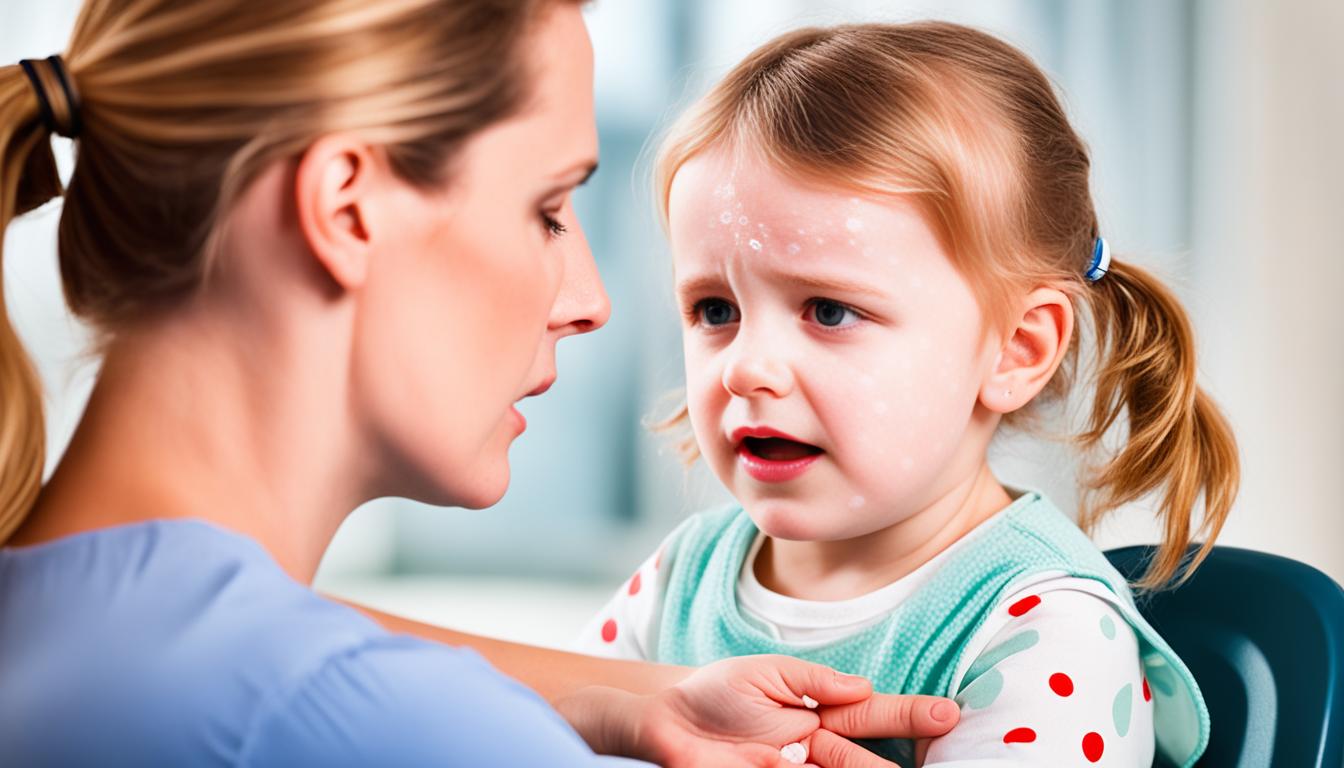Chickenpox, known as varicella, is very contagious. It’s caused by the varicella virus and typically hits kids. But, adults can get it too.
The disease shows up as many blisters that cover the body and mouth. It spreads easily through contact or from the breath of sick people. For pregnant women, catching chickenpox can be dangerous. It might cause birth defects or a miscarriage. The best way to avoid it is through vaccination. As for treatments, people are looking into possibilities like stem cell therapy.
Key Takeaways:
- Chickenpox is caused by the highly contagious varicella virus.
- Main symptoms include blistering blisters all over the body.
- Chickenpox spreads through direct contact or respiratory droplets.
- Pregnant women and their fetuses are at risk of complications.
- Vaccination is the best method for prevention and treatment.
Causes and Transmission of Chickenpox
Chickenpox comes from the varicella virus. It’s very contagious and mostly affects kids. But, adults can get it too. Learning how it spreads helps stop its transmission.
Causes of Chickenpox
The varicella virus causes chickenpox. It gets in through breathing in or touching someone with it. You can also get it from things that an infected person used, like toys or towels.
Transmission of Chickenpox
Chickenpox spreads easily from one person to another. It mainly spreads through:
- Direct contact: This means touching an infected person’s rash or their saliva. It’s a big way chickenpox spreads.
- Respiratory droplets: The virus can also be in the air when an infected person coughs or sneezes. Breathing in these droplets can give you chickenpox.
- Indirect transmission: Sharing things like toothbrushes can spread the virus too. Being careful not to share is important, especially when chickenpox is around.
Even if you’ve had chickenpox or got the vaccine, you could still get shingles. Shingles is when the virus reactivates, causing a painful rash.
To stop chickenpox from spreading, good hygiene is key. Avoiding close contact with infected people and getting vaccinated are also important steps.
Symptoms, Complications, and Treatment of Chickenpox
Chickenpox is a viral infection that comes in clear steps. Each stage has its own symptoms. Knowing these can help deal with the disease well.
Symptoms of Chickenpox
The virus can stay hidden in the body for 10-21 days. Then, it starts to show. First, you might get a mild fever, a headache, and a red rash. This rash turns into fluid-filled blisters.
During the disease’s peak, you might face a high fever, lose your appetite, and feel very tired. Blisters can appear all over, even inside the mouth and on the genitals.
Complications of Chickenpox
Even though it’s usually mild, chickenpox can cause some big problems. Serious issues might include bacterial skin infections from scratching. It could also inflame the brain (encephalitis) or infect the lungs (pneumonia). Those with weak immune systems face additional risks.
Another rare but severe risk is nephritis, an inflammation of the kidneys.
Treatment of Chickenpox
There’s no specific medicine for chickenpox. Doctors aim to help with symptoms and prevent problems. You can:
- Take over-the-counter painkillers for fever and pain.
- Use calming lotions or oatmeal baths to ease itching.
- Keep fingernails short and clean to avoid infections from scratching.
- Wash your hands often to stop the virus from spreading.
Antiviral drugs might be given in serious cases. This includes pregnant women, people with weak immune systems, and those with long-term skin issues.
| Treatment Options | Benefits | Considerations |
|---|---|---|
| Over-the-counter pain relievers | Reduces fever and discomfort | May have side effects if not taken as directed |
| Calamine lotion and oatmeal baths | Soothes itching | May provide temporary relief |
| Antiviral medications | Reduces the severity and duration of the illness | May have side effects and are typically reserved for high-risk individuals |
Conclusion
Chickenpox is serious, especially for pregnant women and those with weaker immune systems. The best way to avoid it is by getting vaccinated. The varicella vaccine helps both kids and adults who aren’t immune.
Stem cell therapy might offer new ways to treat chickenpox in the future. For now, it’s important to get vaccinated on time and keep clean to lower the chance of getting chickenpox. This also helps prevent its serious effects.
To stay safe from chickenpox, focus on preventing it. Make sure to get your vaccines and urge others to do so as well. By doing this and keeping clean, we can lessen chickenpox’s impact and protect our community’s health.

